#i think the appropriation of terms like virtue signaling and cancel culture by the right is unfortunate.
Explore tagged Tumblr posts
Text


Imagine being a 50-year-old straight cis man and feeling threatened by a post politely requesting a reblog in a tiny act of solidarity against a marginalized group, a request that literally says you don't have to though 👉👈 right beneath it
like bro if you can't handle being politely asked to reblog as solidarity without feeling attacked, you do not belong on tumblr of all platforms good ol sir
Could you maybe reblog this post if you think respecting trans peoples' names and identities is a basic right and not a political opinion?
No pressure. Just seeking some validation of my sentiment. Due to some. people
#blocklist#like bro if you saw how these posts are normally framed you would have a fucking heart attack on the spot dude#not even gonna unpack their gRiPe wItH CiS. confident the audience that sees my posts can quickly identify the many. MANY issues there#go talk to your fully adult children or harass people to join your religion or something i d k 💀#i think the appropriation of terms like virtue signaling and cancel culture by the right is unfortunate.#there are real issues to be talked about that those terms are 100% suitable for#but instead I have to become guarded and mistrusting when I see somebody say ViRtUe SiGnaLiNg or CaNceL cULtUrE#because people like this dude use it so often in this way that he uses it#transphobia tw#queerphobia tw#transheterophobia#queerheterophobia
73K notes
·
View notes
Text
On Babbushka
There is a group of well-known writers in the fandom who have been discouraged and put down by one of their own, Zannah - @babbushka. It happens behind the scenes in DMs. It happens in posts and tags.
In DMs, she has started conversations with seemingly innocent questions. When she doesn't receive the response she was aiming for, she diverts the conversation to criticizing and humiliating the person. She has attacked writers for tagging—or not tagging—a post in a way she deems appropriate. She has gotten into arguments over how characters were portrayed and then tried to claim victimization when the other person wouldn't knuckle under.
She will appeal to her following to attack any fan or creator who has an opinion that differs from her own. She will encourage friends to send rude anons. Those same friends will also DM the target with rude remarks.
Several creators have stopped writing altogether because of their interactions with her.
We are tired of being discouraged. We are tired of being talked down to. We are tired of being bullied. Enough is enough. Under the cut we share our stories, let the chips fall where they may. It's up to you, the reader, to decide whether to support her.
We can only warn up-and-coming writers, artists, fans, and supporters of her behavior.
-
Hope - @callmehopeless
The Australian bushfires of the 2019-2020 season were nightmarish—for those living through it and those witnessing. As the season went on, cries for help increased. Joaquin Phoenix used the time during his Best-Actor acceptance speech at the Golden Globes to call for unity, action, and accountability. Regardless of what we may think of him, it was a thoughtful speech.
Hope, who is an Australian, found Mr. Phoenix's message encouraging and reblogged a gifset of his speech.

That morning, Zannah made a post about Mr. Phoenix's shady past and his association with a known sexual predator. The main reason wasn't because his speech was inappropriate or not timely, but because she didn't think he should be the one to get the attention over other actors who had spoken of the bushfires during the Golden Globes.
While Hope confessed she was scared of the bushfires, scared for her loved ones, Zannah was more concerned with purity. To Zannah it was about the face of the message, not the message itself. It didn't matter that Mr. Phoenix was amplifying support for Australia, what did matter was that he had done bad things.
It was virtue signaling on Zannah's part.
Still, this remains a complicated argument. Can a person who has done bad things actually have something positive to add to a cause? Should we listen to a problematic person if they share an insight? Does it reflect poorly on us to agree with their isolated statement? Will we be canceled, too? What about the bigger picture?
In this case, the bigger picture was hundreds of homes were destroyed in the bushfires and families were displaced. People died, thousands of animals died. And it was because of climate change. Mr. Phoenix called for his rich peers to examine their respective lifestyles and to give back.
Yes, Mr. Phoenix has done bad things. Yes, he has associated with people who have done bad things. His words resonated with people on Tumblr, and they reblogged part of his speech. He said something that gave Hope hope.
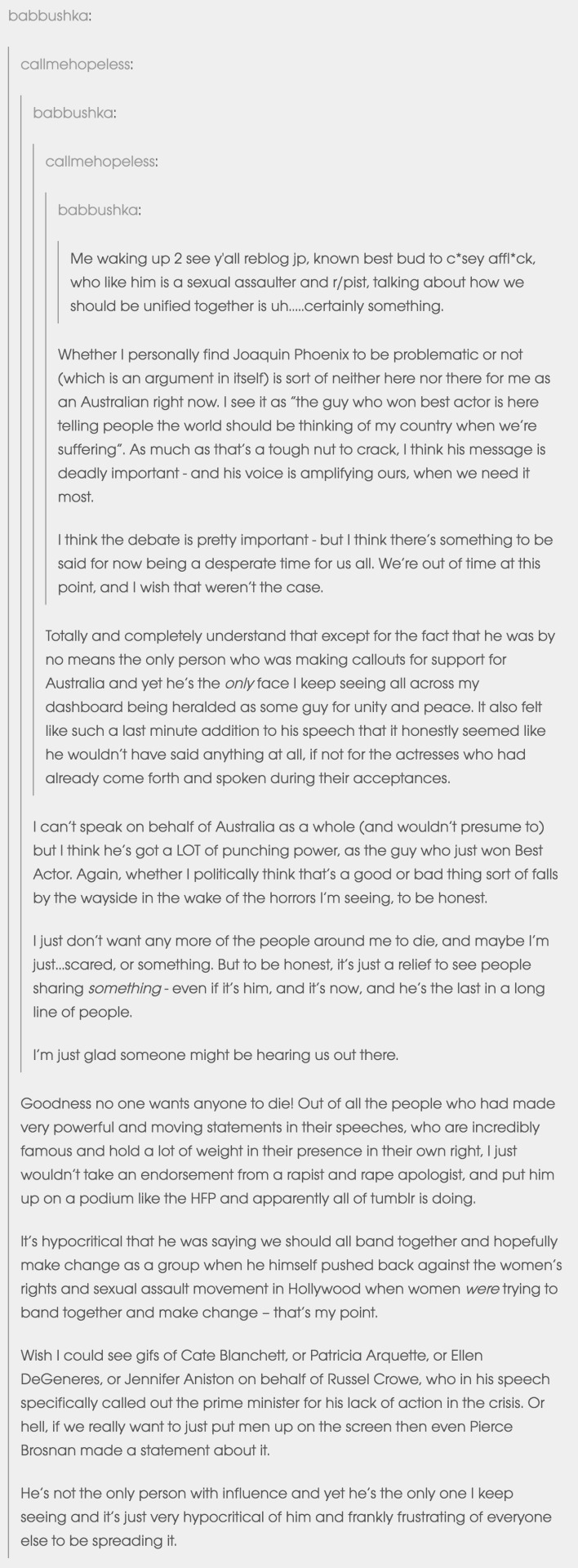
Hope was asked by a third party how they could help. She came back with a resource guide for those who wanted to send aid to Australians.
When it became obvious Zannah wouldn't silence Hope, Zannah decided to sub-post about the interaction. There, she accused Hope of being a rape apologist for reblogging a gifset and finding a little comfort in it. Zannah placed her ego before someone who was facing a very real danger.
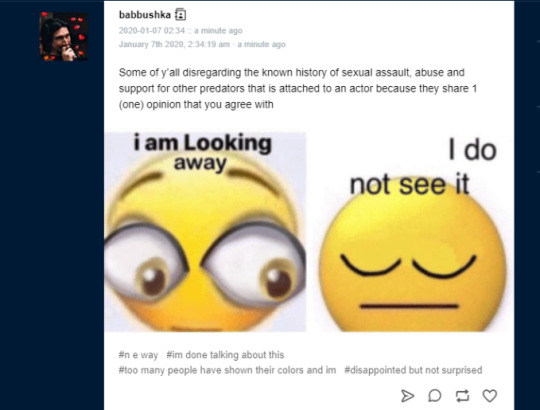
Side-eying an actor is one thing, shaming a person you know for finding solace during a scary time is another. Hope isn't responsible for which voice got picked up. The only "colors" being shown here are Zannah's. She put her own concerns about being perceived as morally pure above actually supporting a friend.
I'll keep this brief - I knew Zannah for many years. And on one of the lowest weeks of my life, when my suburb was burning down and I feared for my family: she convinced me I was a rape apologist for sharing Joaquin Phoenix's speech asking for action on bushfires. In all my life, I never felt more alone. To add insult to injury, she then posted memes mocking me - something that has stuck with me to this day.
I've had dear friends quit the fandom because of her kinkshaming. I've had people I love message me distraught over what she's said.
Enough is enough.
— @callmehopeless
-
Rose - @the-wayward-rose
This PM exchange started after I tagged my reblog of Zannah's fic Feast (Cameron Bistle x Reader) with cw: white reader. I had been on her taglist, and I wanted to show support because I liked the fic overall. For context, the reason for my tag is because of this sentence:
"But then you're blushing so pretty and squeezing his hand affectionately and reaching for the handle to the passenger side of his car, and then you're laughing when he swats your hand away to open it for you, and then you're beckoning him down as if to ask a question – only to place a chaste kiss to his lips instead."
This is from Cameron's point of view.
She asked the reason for the tag, and I explained it was because of the use of "blush" to describe Reader's appearance.
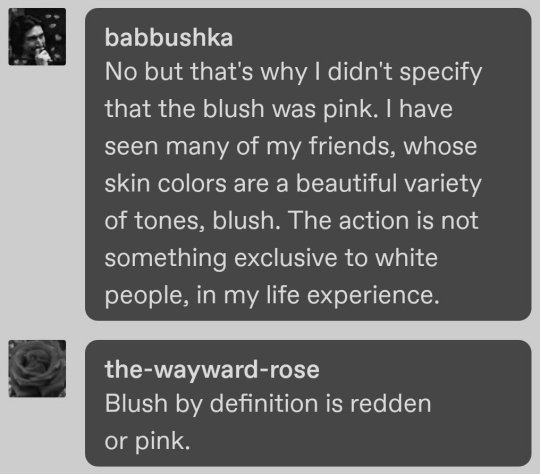
She misunderstood my premise. I did not mean only white people blush.
According to Merriam-Webster, blush means "a reddening of the face especially from shame, modesty, or confusion" or "a red or rosy tint."
It is an autonomic response, though. It happens in all humans for body cooling and nonverbal communication. The main problem with using it universally is that melanin obscures the appearance of said autonomic response.
Here's an example of three runners:

The two pale women, left and center, are pink in the face. They are blushing. The woman of color on the right is likely blushing, too. However, the melanin in her skin obscures the blood in her cheeks. She is not pink.
That's the pitfall of the word "blush." The observer can't always see it. We know what it feels like. We all do it. The face and/or neck gets hot. The use of "blush" is shorthand in narrative, and I understand that. Nevertheless, when writing to cater to a reader-insert audience of unknown heritage, writers need to consider describing with universal terms.
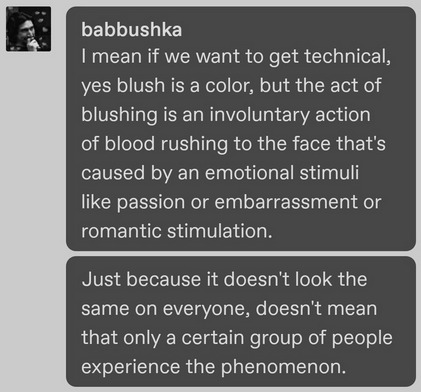
Again, she misunderstood my premise. I clarified by asking how Cameron sees the Reader blush under an abundance of melanin:

She sidestepped the physiological explanation to go straight for justification. She tried to legitimize "blush" as "perhaps [this]" or "perhaps [that]" when I stated earlier that blush by definition is pink or is to redden. That's the logic. A noncommittal, covering-all-the-bases, complicated defense diluted the conversation.
With her earlier "I have friends of color, hence I can't be exclusionary" statement, I wasn't sure she would get my point. I take full responsibility for not explaining, too. I should've asked for some time to gather my thoughts, but I didn't. Truthfully, I was unprepared, because I didn't think my insignificant tag would be an issue.
Also, I was confused why she was trying to police my blog.
Her replies came rapidly—before I could mention my confusion—and felt aggressive in the moment. Maybe that wasn't her intention, but the road to hell is paved with good intentions.
That doesn't take away from the fact that words have meaning. It's why we use specific words. It's not understood in the narrative that her use of "blush" could mean a bunch of things. If I had known, I wouldn't have tagged as I did. How is a reader of color supposed to know that? How does Cameron see Reader's blush if she has darker skin?
As writers, we don't know who is reading. Someone could be very pale or very dark. A person with medium-toned skin can turn a shade of pink or red. A person with darker-toned skin will not. We can't assume all readers are medium to pale. We need to develop better writing skills. We have to include everyone.
Readers of color > White-writer feelings
When I stood my ground, she doubled down, stating I made no sense in my tagging and that I lacked the ability to learn from her. She then diverted the argument, attacking a ficlet I wrote a few days beforehand—which had nothing to do with this argument. The Christian imagery in that ficlet was upsetting to her and "in such poor taste" because she headcanons Flip Zimmerman (BlacKkKlansman) is 100% culturally and ethnically Jewish.
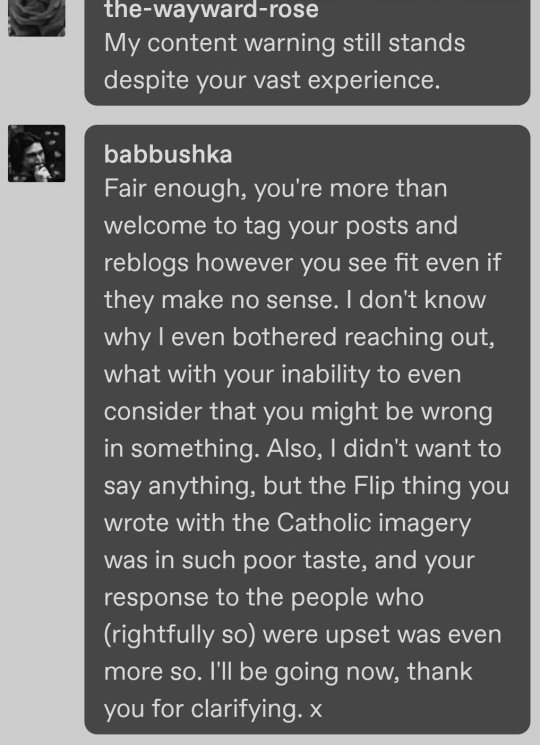
Flip stated in the movie:
"I'm Jewish, but I wasn't raised to be. It wasn't part of my life. I never thought much about being Jewish. Nobody around me was Jewish. I wasn't going to a bunch of Bar Mitzvahs. I didn't have a Bar Mitzvah. I was just another white kid. And now I'm in some basement denying it out loud[...] I never thought much about it. Now I'm thinking about it all the time. About rituals and heritage. Is that passing? Well then, I have been passing."
By his own admission, Flip is ethnically Jewish, but not culturally. These are two separate things, and that should be recognized. While Judaism is ethnically and culturally entwined in ways that other religions are not, one does not equate the other. You can be one and not the other.
At the time, I didn't want her to sic her 3000+ followers on me. I wasn't going to argue further. I asked myself if the ficlet was important and worth anon-hate and realized, no, it wasn't. It was a throw-away.
And since I'm not culturally Jewish, maybe I had misstepped. And since Zannah is both culturally and ethnically Jewish, I asked for her guidance.
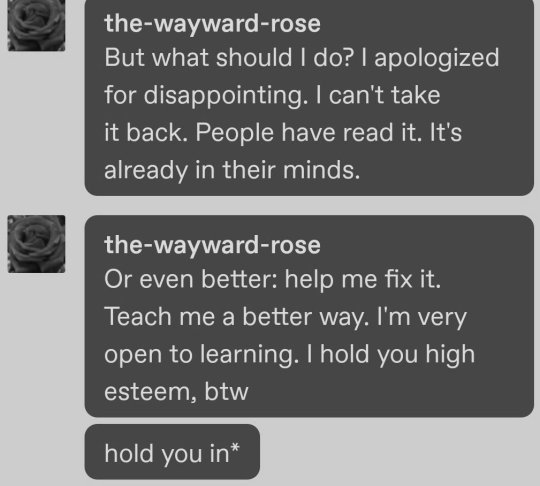
She flatly refused my request. I don't know how I was supposed to learn from her if she wouldn't teach me.
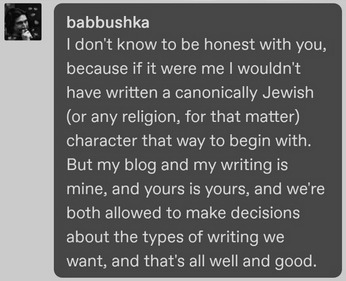
It sounded as if she wanted me to delete the whole fic. Like none of it was worth saving because it hadn't been Zannah-approved. I had gone against her headcanon, and the fic was too offensive to fix.
The last sentence was supposed to cover her back from criticism, and it placed all the responsibility on me. Obviously, she was above such petty concerns as someone else's blog or writing. Never mind that she had just attempted to get me to change my tagging system and rewrite my ficlet. On my blog.
Later, I figured out she was only criticizing and not offering a constructive critique. Her argument was not in good faith. It was retaliation for not giving her the obedience she thought she was owed.
This is the passage that offended her:
"It’s because of the way he fucks you. Like it’s confession—though he’s never been much of a church-going man. Every touch, every thrust, is a truth between you. Even when it’s rough and greedy. It feels like flagellation when you claw his back. He wears the sin proudly."
This is what I edited it to:
"It’s because of the way he fucks you. Every touch, every thrust, is a truth between you. Even when it’s rough and greedy. It feels like flagellation when you claw his back. He wears your marks proudly."
Yeah, I'm not pleased with the revised passage. It's lost its teeth, but I keep it.
The anonymous message(s) she mentioned weren't very anonymous, either. Unfortunately, I've since deleted the two messages. I had apologized to Anon for disappointing them. I said that if the fic was too much, they should unfollow and block me. I meant that in a self-care way. At the same time, I did not—and do not—owe anyone discourse. I don't have to explain my art when it doesn't hurt anyone. And no one was hurt by some purportedly misplaced religious imagery.
I have been silent about this since late January/early February. I was embarrassed. I had been bullied into changing my blog and my fic by someone who proclaims to never do anything of the sort. I had been a fool. Since this conversation with her, I have been blocked/blacklisted by third-parties, most likely at her behest, when none of this exchange had been necessary.
-
Kassanovella - @kylorengarbagedump
Zannah's followers have asked her about Kassanovella’s Fix Your Attitude. For context, it's currently one of the most kudo-ed fics for Kylo Ren x Reader on AO3. It had a bit of a renaissance earlier in 2020 because a TikToker wrote a song for it.
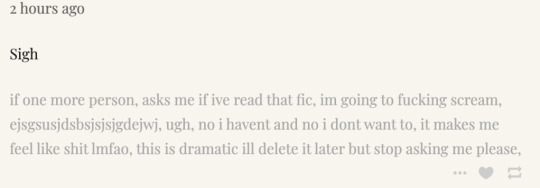
There is nothing wrong with not wanting to read a fic. If the subject matter doesn't work for a reader, they don't have to partake. Easy as that. So, these tags aren't a problem.
However, it led to this...
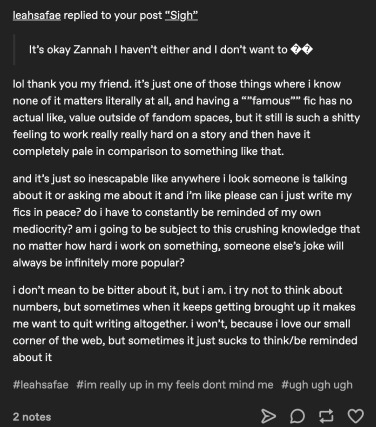
She lashed out, calling Kassanovella's fic a joke. A joke.
She implied her fics should be as popular as Kassanovella's because she works really hard on them. She admitted she's tied to the metrics. She implied she wouldn't be writing fic if not for the external validation.
Here's the thing about fanfic: readers like what they like. They don't care about a writer's effort. They only know what works for them. They comment and give kudos, reblog and like what they connect with. That is not under the writer's control. All a writer can do is try their best and concentrate on what they're passionate about.
To bash another writer's fic because it's popular is disrespectful. This whole bitter rant drips of entitlement and is an affront to Kassanovella.
Some time later, an incident happened in a chatroom during a streaming event for veterans by Arts In the Armed Forces (Adam Driver's organization). At least one fan brought up Fix Your Attitude while waiting for Mr. Driver to make an appearance. They were also disrespectful towards the other presenters by demanding to see Mr. Driver. It caused a big stink within the fandom, and Zannah had some choice words.

While mentioning the fic during the livestream was inappropriate, it was also inappropriate to throw all fans of the fic under the bus as she did in her tag. Sweeping generalizations and incriminations of a subset of fans certainly reads as if she resents those fans for a perceived slight.
Next, Zannah made an earlier disparaging comment about Kassanovella's fic, Little Bird. Unfortunately, that comment is lost. However, the messages supporting the comment remain. (For context, Little Bird is a Kylo Ren x Reader The Handmaid's Tale AU. It has been well received in the fandom, earning thousands of kudos on AO3.)
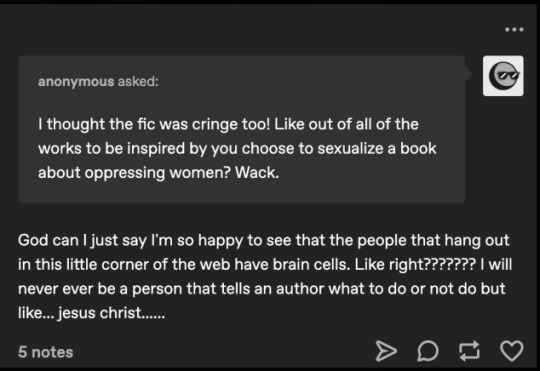
What an author wants to write about and sexualize is their business. Fantasizing about being dominated by Kylo Ren isn't cringe. It's a sexual fantasy. Some sexual fantasies can be disturbing to those who do not share the same kink.
Sexual fantasies are like ice cream. There's a reason why there are different flavors.
Also, "I will never ever be a person that tells an author what to do or not do" is an absolute lie. As evident in this post, Zannah most definitely tells authors what to do or not do.

Again, she bashes Kassanovella, claiming her writing isn't good. Her motivation for bashing Kassanovella can only be speculation. With Zannah's previously stated opinion of Fix Your Attitude, though, it indicates a certain level of negative emotions.
-
Anonymous
An anonymous person came forward with a case of Zannah policing their blog. Anon has a sideblog for their personal AU with Flip Zimmerman. They reblog gifsets and post headcanons. They were an enthusiastic fan of Zannah's and reblogged a few of the gifset she made. Anon tagged their reactions, and Zannah blocked them for it.

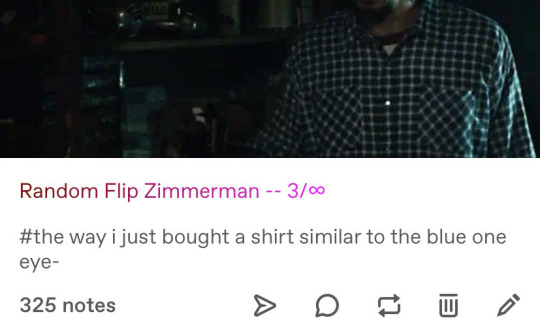


Anon went to Zannah and asked why they were blocked, because all they wanted to do was have fun and support fellow Flip lovers.

Anon was under the impression that because they were shipping themselves, and not Zannah, with Flip, she blocked them. Their personal AU doesn't align with Zannah's headcanon that she alone is married to this character and has his children.
While Zannah's reply may sound innocent, and perhaps it is, it also speaks to someone who has set herself up as the owner of Flip Zimmerman. (Wait until Spike Lee or the real Ron Stallworth hears about that...) It appears that if a fan does not comply with the Zannah-approved headcanon, where only she is married to Flip, that fan shall be blocked. If a fan uses tags on their blog that she does not approve of, that fan will be blocked.
Zannah's policing is disturbing. Going into a blog to look for something as a reason to block is disturbing. Any fan is allowed to use any tag on their blog how they wish. If the OP has said their post can be reblogged, how a reblogger tags is beyond the OP's control. To punish that reblogger for not behaving in a way she finds acceptable is uncalled for and unjust.
-
Anonymous
Backstory: Zannah does not view Ben Solo's arc in the Star Wars sequel trilogy as acceptable canon. However, she does view the story she created for Flip Zimmerman in BlacKkKlansman as completely canon.
This is not the first time she has been asked to clarify her position. Nor is it the first time she has avoided giving an on-topic response. A question asked in good faith should be responded to in kind.
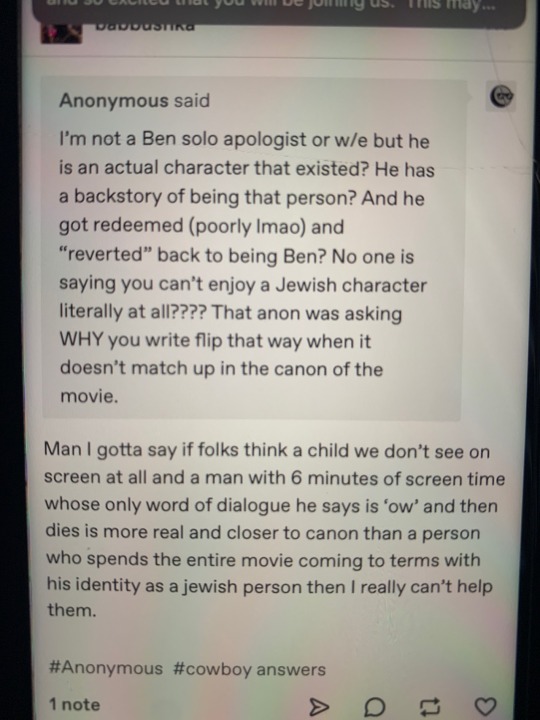
If a creator doesn't want to address the issue, they can state that they don't. Deflecting from the question only muddies the waters. Fans feel dismissed. The creator feels hounded, and comes across as irritated and unapproachable. No one has a positive fandom experience.
There is nothing wrong with having a headcanon. What is wrong is Zannah mandating her headcanon for Flip on the whole fandom. As evident in this post, if a fan does not comply with her headcanon, they will be summarily blocked.
Also, there is nothing wrong with rejecting canon. Writers of transformative works have always done this. The problem is shaming fans who have accepted canon while not offering justification for that shaming. A creator saying they "can't help them" is the creator washing their hands of responsibility from articulating their thoughts when they themselves began criticizing the canon in the first place.
Again, this is a bad-faith argument. Creators can't ask for discussion and attention and then get mad when their viewpoints are challenged. Just because a discussion isn't going a creator's way doesn't mean it's an attack, either. It means people want clarification, and if one criticizes, they should be able to back up their criticisms.
-
While sharing our stories has been freeing, it's not our aim as fellow fans to cancel Zannah. We would hope she would take the opportunity to reflect on the damage she has done to the fandom. We hope we all can move forward with a more approachable and supportive scene.
No one person speaks for our fandom. The actions of one fan do not represent the entire fandom. Whether creator or consumer, you are welcome here.
[posted July 25, 2020]
307 notes
·
View notes
Text
NYT; wrongthink vs. groupthink
The resignation letter of Bari Weiss, an Op-Ed editor of the New York Times. My highlighting in bold.
“It is with sadness that I write to tell you that I am resigning from The New York Times.
I joined the paper with gratitude and optimism three years ago. I was hired with the goal of bringing in voices that would not otherwise appear in your pages: first-time writers, centrists, conservatives and others who would not naturally think of The Times as their home. The reason for this effort was clear: The paper's failure to anticipate the outcome of the 2016 election meant that it didn't have a firm grasp of the country it covers. Dean Baquet and others have admitted as much on various occasions. The priority in Opinion was to help redress that critical shortcoming.
I was honored to be part of that effort, led by James Bennet. I am proud of my work as a writer and as an editor. Among those I helped bring to our pages: the Venezuelan dissident Wuilly Arteaga; the Iranian chess champion Dorsa Derakhshani; and the Hong Kong Christian democrat Derek Lam. Also: Ayaan Hirsi Ali, Masih Alinejad, Zaina Arafat, Elna Baker, Rachael Denhollander, Matti Friedman, Nick Gillespie, Heather Heying, Randall Kennedy, Julius Krein, Monica Lewinsky, Glenn Loury, Jesse Singal, Ali Soufan, Chloe Valdary, Thomas Chatterton Williams, Wesley Yang, and many others.
But the lessons that ought to have followed the election—lessons about the importance of understanding other Americans, the necessity of resisting tribalism, and the centrality of the free exchange of ideas to a democratic society—have not been learned. Instead, a new consensus has emerged in the press, but perhaps especially at this paper: that truth isn't a process of collective discovery, but an orthodoxy already known to an enlightened few whose job is to inform everyone else.
Twitter is not on the masthead of The New York Times. But Twitter has become its ultimate editor. As the ethics and mores of that platform have become those of the paper, the paper itself has increasingly become a kind of performance space. Stories are chosen and told in a way to satisfy the narrowest of audiences, rather than to allow a curious public to read about the world and then draw their own conclusions. I was always taught that journalists were charged with writing the first rough draft of history. Now, history itself is one more ephemeral thing molded to fit the needs of a predetermined narrative.
My own forays into Wrongthink have made me the subject of constant bullying by colleagues who disagree with my views. They have called me a Nazi and a racist; I have learned to brush off comments about how I'm 'writing about the Jews again.' Several colleagues perceived to be friendly with me were badgered by coworkers. My work and my character are openly demeaned on company-wide Slack channels where masthead editors regularly weigh in. There, some coworkers insist I need to be rooted out if this company is to be a truly 'inclusive' one, while others post ax emojis next to my name. Still other New York Times employees publicly smear me as a liar and a bigot on Twitter with no fear that harassing me will be met with appropriate action. They never are.
There are terms for all of this: unlawful discrimination, hostile work environment, and constructive discharge. I'm no legal expert. But I know that this is wrong.
I do not understand how you have allowed this kind of behavior to go on inside your company in full view of the paper's entire staff and the public. And I certainly can't square how you and other Times leaders have stood by while simultaneously praising me in private for my courage. Showing up for work as a centrist at an American newspaper should not require bravery.
Part of me wishes I could say that my experience was unique. But the truth is that intellectual curiosity—let alone risk-taking—is now a liability at The Times. Why edit something challenging to our readers, or write something bold only to go through the numbing process of making it ideologically kosher, when we can assure ourselves of job security (and clicks) by publishing our 4000th op-ed arguing that Donald Trump is a unique danger to the country and the world? And so self-censorship has become the norm.
What rules that remain at The Times are applied with extreme selectivity. If a person's ideology is in keeping with the new orthodoxy, they and their work remain unscrutinized. Everyone else lives in fear of the digital thunderdome. Online venom is excused so long as it is directed at the proper targets.
Op-eds that would have easily been published just two years ago would now get an editor or a writer in serious trouble, if not fired. If a piece is perceived as likely to inspire backlash internally or on social media, the editor or writer avoids pitching it. If she feels strongly enough to suggest it, she is quickly steered to safer ground. And if, every now and then, she succeeds in getting a piece published that does not explicitly promote progressive causes, it happens only after every line is carefully massaged, negotiated and caveated.
It took the paper two days and two jobs to say that the Tom Cotton op-ed 'fell short of our standards.' We attached an editor's note on a travel story about Jaffa shortly after it was published because it 'failed to touch on important aspects of Jaffa's makeup and its history.' But there is still none appended to Cheryl Strayed's fawning interview with the writer Alice Walker, a proud anti-Semite who believes in lizard Illuminati.
The paper of record is, more and more, the record of those living in a distant galaxy, one whose concerns are profoundly removed from the lives of most people. This is a galaxy in which, to choose just a few recent examples, the Soviet space program is lauded for its 'diversity'; the doxxing of teenagers in the name of justice is condoned; and the worst caste systems in human history includes the United States alongside Nazi Germany.
Even now, I am confident that most people at The Times do not hold these views. Yet they are cowed by those who do. Why? Perhaps because they believe the ultimate goal is righteous. Perhaps because they believe that they will be granted protection if they nod along as the coin of our realm—language—is degraded in service to an ever-shifting laundry list of right causes. Perhaps because there are millions of unemployed people in this country and they feel lucky to have a job in a contracting industry.
Or perhaps it is because they know that, nowadays, standing up for principle at the paper does not win plaudits. It puts a target on your back. Too wise to post on Slack, they write to me privately about the 'new McCarthyism' that has taken root at the paper of record.
All this bodes ill, especially for independent-minded young writers and editors paying close attention to what they'll have to do to advance in their careers. Rule One: Speak your mind at your own peril. Rule Two: Never risk commissioning a story that goes against the narrative. Rule Three: Never believe an editor or publisher who urges you to go against the grain. Eventually, the publisher will cave to the mob, the editor will get fired or reassigned, and you'll be hung out to dry.
For these young writers and editors, there is one consolation. As places like The Times and other once-great journalistic institutions betray their standards and lose sight of their principles, Americans still hunger for news that is accurate, opinions that are vital, and debate that is sincere. I hear from these people every day. 'An independent press is not a liberal ideal or a progressive ideal or a democratic ideal. It's an American ideal,' you said a few years ago. I couldn't agree more. America is a great country that deserves a great newspaper.
None of this means that some of the most talented journalists in the world don't still labor for this newspaper. They do, which is what makes the illiberal environment especially heartbreaking. I will be, as ever, a dedicated reader of their work. But I can no longer do the work that you brought me here to do—the work that Adolph Ochs described in that famous 1896 statement: 'to make of the columns of The New York Times a forum for the consideration of all questions of public importance, and to that end to invite intelligent discussion from all shades of opinion.'
Ochs's idea is one of the best I've encountered. And I've always comforted myself with the notion that the best ideas win out. But ideas cannot win on their own. They need a voice. They need a hearing. Above all, they must be backed by people willing to live by them.
Sincerely,
Bari “
It’s all there; the Left’s engrained anti-semitism (so often now cloaked by ‘respectable’ anti-Zionism), the refusal to admit of other opinions, let alone to acknowledge the possibility of their validity, the narrowing of the mind, the cancel culture, the terror of the twitter storm and the mob in the street (”the people” as they like to call themselves) , the sheer spinelessness of the institutional ‘leadership’ unless it is in support of those people who have the ‘right’ opinions. Sadly, exactly the same process is going on at The Guardian, the BBC and our once great universities. Only Illiberal Groupthink is allowed, and former bastions of liberalism close down independent thought, the better to signal their virtue.
13 notes
·
View notes